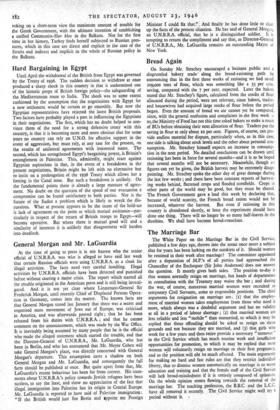Bread Again
On Sunday Mr. Strachey encouraged a hesitant public and a disgruntled bakery trade" along the bread-rationing path by announcing that in the first three weeks of rationing we had saved ro9,000 tons of flour, which was something like a 33 per cent. saving, compared with the 7 per cent. expected. Later the bakers stated that Mr. Strachey's figure, calculated from the stocks of flour allocated during the period, were not relevant, since bakers, traders and housewives had acquired large stocks of flour before the period began. Even the amount of bread we ate cannot yet be computed, since, with the general confusion and complaints in the first week so, the Ministry of Food has not this time asked bakers to make a count of BUs before obtaining their next allocation of flour. Traders put the saving in flour at only about ro per cent. Figures, of course, can pro- vide endless material for dispute, particularly when, as in this case, one side is talking about stock levels and the other about personal con- sumption. Mr. Strachey himself expects an increase in consump- tion in the next period. No detailed conclusions can be drawn until rationing has been in force for several months—and it is to be hoped that several months will not be necessary. Meanwhile, though rys figures can yet be given, the British harvest may be extremely disap- pointing. Mr. Strachey spoke the other day of great damage during the last few weeks ; and there have been constant reports of harvest- ing weeks behind, flattened crops and flooded cornfields. Crops in other parts of the world may be good, but they must be shared. The French Government gave a lead this week by declaring that, because of world scarcity, the French bread ration would not be increased, whatever the harvest. But even if rationing in this country is abandoned shortly, at least the experiment should have done one thing. There will no longer be so many half-loaves in the dustbins. We shall have become bread-conscious.


























 Previous page
Previous page